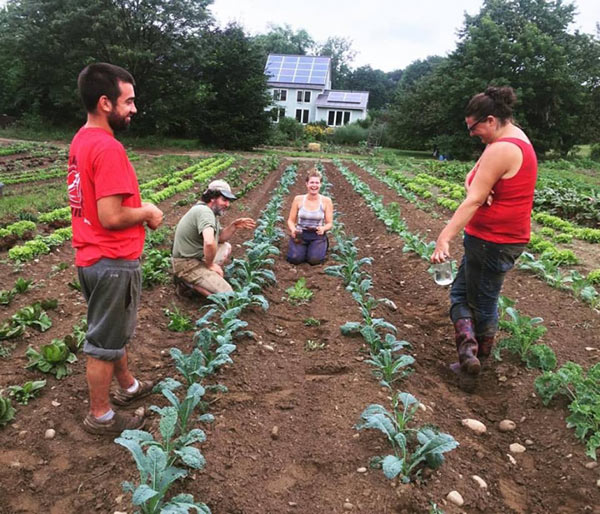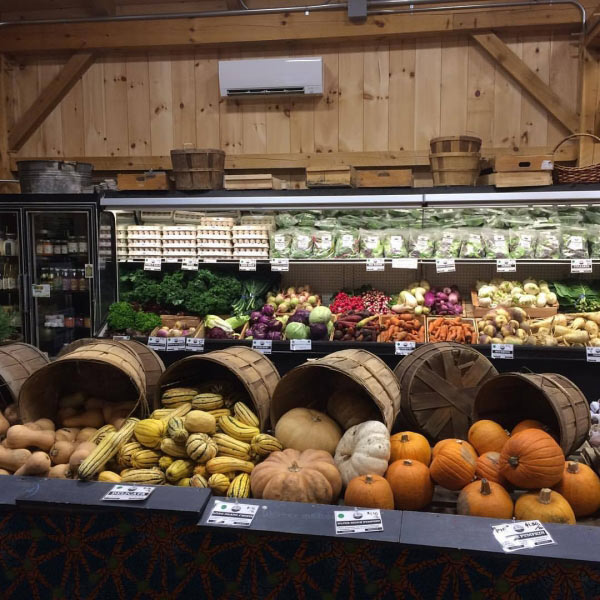May 15, 2018 – We recently had the opportunity to talk with OFRF Board President Jeremy Barker Plotkin of Simple Gifts Farm in Amherst, Massachusetts. Jeremy and his team are stewards of the North Amherst Community Farm (NACF), community-owned land preserved in perpetuity for farming. They are working to ensure the land remains an organic community farm, a wildlife corridor, and a place for local residents to enjoy nature and walking trails. They run the farm as an ecological unit, integrating vegetable crops and livestock, and connecting the community with their food supply. They also run an apprenticeship program to train the next generation of organic farmers.
Have you always farmed organically? Why?
Right from the start. Moving towards more sustainable food production was the appeal. I don’t think I ever considered doing anything different. For me, farming is a way to embody my political ideals, do something positive, and provide a real tangible alternative.
How big is your farm?
It’s about 30 acres and we manage a neighboring farm that’s about 20 acres. We’re growing about 12 acres of vegetables. We’ve cut back from 18 to try to focus our efforts a little more, and we get as much out of 12 acres as we do out of 18 by taking better take of it.
What do you grow?
Quite a bit of lettuce, tomatoes, a fairly broad spectrum of seasonal vegetables, kale, chard. We have a whole pick-your-own garden that’s part of the CSA share that includes flowers, herbs, veggies, and about an acre and a half of strawberries.
We have about 250 laying hens, and pasture-raised eggs are available for most of the year. Pasture-raised pork and grassfed beef is always available for purchase by the cut.
Where do you sell your products?
We stopped going to farmers’ market after we opened our farm store last July. The store, CSA, and pick-your-own garden are all integrated now. People pick up their share at the store and the pick-your-own is part of the share.
I like the integrated experience. People participating in the CSA also get to spend time on the farm.
Especially during strawberry season, people love to bring their kids.
What do you you want people to know about why it’s important to support organic agriculture?
It’s just healthier. One of the objections I have to the way people talk about organic is that it’s all very focused on is it healthier? Is it free of pesticides? I think it’s also important to recognize the indirect benefits—knowing your water is cleaner and that there’s less chemicals in the environment because you’re buying organic food. Also, studies are finding that organic farming sequesters more carbon than non-organic farming and can be instrumental in reversing climate change.
What was your most valuable resource for information when you were a beginner farmer?
It was other farmers and that is still the case. I worked for other farmers before I started farming myself. I went to graduate school in Maine and visited a lot of farmers before I started farming myself.
I’m thinking about some of the next generation that want to farm organically or non-organic farmers that want to transition to organic that aren’t in areas where there are a lot of organic farmers. What do you think would be a good way to help?
We have an apprenticeship program that helps people that want to become organic farmers. Mentorship programs are great, especially for people transitioning to organic.
What is your most valuable resource now?
I get a lot of information from UMass Extension and the other Extension services in New England. Some of their expertise is exclusively organic focused and some of it is applicable to organic. There’s a lot of good information out there. Talking to other farmers, my neighbors, is still helpful. Actually, not going to farmers’ market has meant that I have less connection with other farmers. Part of what goes on at farmer’s market is talking to other farmers.
Switching gears a little bit, why do you think organic farming research is important?
Organic farming is a more knowledge- and science-based way of doing things. You need to understand the lifecycles of pests and the biological interactions. You need to know how soil works. There’s so much more you need to know to farm organically. Research focused on organic is much more valuable because the system is so different.
Organic farming, especially as it relates to certification, is about what you can’t do, what you can’t spray, what fertilizers you can’t use. When you take all of those things out of your toolbox, you have to use different tools. How do you control pests? There’s organic sprays out there but they don’t work as well. You get to a point where you need more knowledge in order to generate soil fertility without just getting it out of a bag.
Organic research can be good for any type of farmer, maybe some that are thinking about incorporating more sustainable practices. I think organic research benefits more than organic farmers.
Absolutely.
Do you have a story about how research helped you and your farm?
Right now, at the University of Massachusetts, they’re trying to figure out how to control cabbage aphids organically. This is a pest that has become a big problem with kale and all the fall brassicas. They’re doing some good work there figuring out how to deal with it.
I’ve done some research on my farm too. When we first started, I applied for SARE grants, which provided another source of income for me. We did two projects on disease resistance in tomatoes. Two seasons ago we were looking at different ways of fertilizing potatoes. There are growers who use a much more complicated intensive strategy that isn’t as focused on the macronutrients in the soil. It involves a lot of spraying of liquid nutrients and is supposed to maximize the health of your plants. While that way of fertilizing does work, we’ve achieved equivalent yields and disease pressure just by providing organic nitrogen based on our soil tests. This was a system I was interested in and had been playing around with—getting the SARE grant allowed me to look at it in a more rigorous way.
Do you think the demand for organic food will continue to grow?
Yes, it’s a consistent trend.
The organic label has come under attack in the media lately. Some people question whether the price differential is worth it, and whether products labeled organic are really following the organic guidelines. Also, with so many labels, things seem to be getting really confusing for consumers. What do think we need to do to preserve the integrity of the organic label?
Those issues have always been there. There may be a little more intensity right now, but they’ve always been there. As soon as we got under federal control it made the label subject to the political process and vulnerable to people messing with it. Organic is providing a minimum standard that says you can’t do certain things. There may be more, there may be further you can go, but that minimum standard means something to people. That’s why organic has been successful.
What do think of the movement to a regenerative certification?
I’m not 100 percent sure how it’s going to go. I can see the appeal of trying to put something forward that’s kind of more true to the original vision. I can also see the danger in fracturing and diluting the message a bit. I see how organic is the minimum standard and now people want to push it a little further. The thing I’m not sure about is it seems difficult to regulate, to come up with a unified standard for what regenerative agriculture means. That’s exactly why organic has come to mean what it has—you don’t use chemicals because that’s something you can take on in a regulatory way. You can’t take on biological soil fertility and crop rotations and all the kinds of positives of organic in a regulatory way. It’s not impossible, but I’m a little skeptical.
What are the top three reasons you think people should purchase organic whenever possible?
The environmental benefits, the soil carbon sequestration benefits, and the benefits to their personal health.





